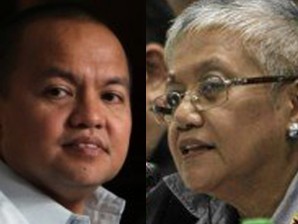MANILA, Philippines — After the historic signing of the framework agreement between the Philippine government and the Moro Islamic Liberation Front (MILF) Monday, Presidential Peace Process Adviser Teresita Deles and chief government negotiator Marvic Leonen briefed members of the House of Representatives on the details of the peace process envisioned to halt unrest in Mindanao.
They presented the newly signed preliminary peace deal to the House committees on Peace, Reconciliation, and Unity; Mindanao Affairs; and Muslim Affairs whose members grilled them on how the peace process would end decades of conflict in Mindanao and create the Bangsamoro political entity that will replace the Autonomous Region in Muslim Mindanao.
Leonen said that the agreement was neither a legal document nor a treaty, but a political document which they were negotiating with the MILF. He said that the new agreement would not reject the Tripoli agreement nor the agreement with the MILF back in 1996 but in fact “complements the process.”
On questions of the central government’s relationship with the Bangsamoro political entity, Leonen said that it would be asymmetric meaning “hindi pantay (uneven). One would be above the other.”
He said that the transition commission created through an executive order will consult with concerned communities and be committed to ensuring a democratic process in its work. He explained that the Bangsamoro Basic Law will be “written by the people and approved by Congress.”
The transition commission will be tasked to create a draft of the bill before it is submitted to lawmakers who will deliberate it like a usual law “with a first, second and third reading, and bicameral conference.” Only after it is certified by Congress will the bill be submitted to President Benigno Aquino III.
“Because it is a special law, it will be submitted to the people for ratification. The question to be asked will be whether they approve of it and whether they want to be included,” Leonen said, urging the legislators to back the peace process because “this is the best agreement so far. I beg you to support this agreement.”
Leonen told legislators that the motherhood agreement on the peace process will hold three annexes on power sharing, wealth sharing, and normalization. Lawmakers representing conflict-riddled areas in Mindanao were particularly interested in details on how the new agreement with the MILF will be able to improve the peace and security situation in their districts.
As part of the provision on normalization, Leonen said that the MILF has agreed to decommission its forces gradually while the government has committed to also gradually transfer law enforcement activities of the army to a reform police in Mindanao. He said that the move would be part of the transformation program of the Philippine National Police.
The new political entity Bangsamoro can be achieved without amending the Constitution but added that it would require much work from legislators, he added.
He said that they target the completion of necessary documents for the agreement by the end of the year while the Bangsamoro Basic Law is envisioned to be ready during the 16th Congress. The chief negotiator said that he was optimistic the process would be done by the end of the Aquino administration in 2016.
For now, what the House of Representatives is tasked to deliver is a resolution supporting the framework agreement. Deputy Speaker Lorenzo Tanada III said he foresees the resolution’s approval before Christmas break.
